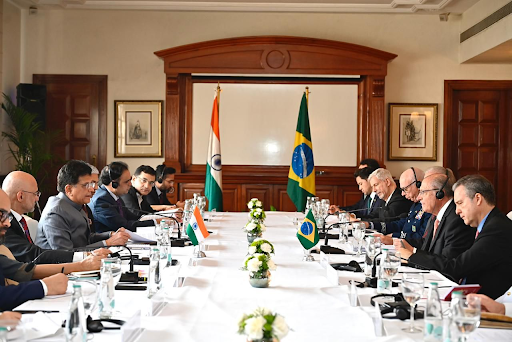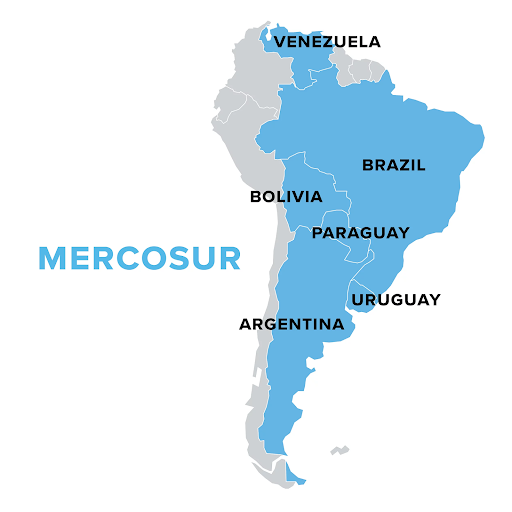



India and Brazil’s strategic partnership strengthens South-South cooperation through defense, space, and trade collaboration. Targeting $20 billion bilateral trade by 2030 via the India-Mercosur PTA, both nations pursue balanced growth, multilateral engagement, and diversified sectors to build a resilient, future-oriented, and mutually beneficial relationship.

Copyright infringement not intended
Picture Courtesy: ddnews
India and Brazil issued a joint declaration to deepen their existing Preferential Trade Agreement with the MERCOSUR trading bloc.
Early Diplomatic Ties (Post-1948)
Diplomatic relations were established in 1948. Both nations, as developing democracies, shared common values and early cooperation focused on areas like agriculture and education.
Towards Strategic Partnership (2000s)
Relationship elevated to a Strategic Partnership in 2006. Formation of multilateral groupings like BRICS (Brazil, Russia, India, China, South Africa) and IBSA (India, Brazil, South Africa Dialogue Forum), which provided a platform for enhanced cooperation.
The partnership has diversified, with high-level exchanges, strong defense cooperation (including Defence Cooperation Agreement in 2003), and collaboration in space and energy.
A Gateway to Latin America
As the largest economy in Latin America, Brazil serves as India's gateway to the MERCOSUR trade bloc (comprising Brazil, Argentina, Uruguay, and Paraguay).

Energy Security Partner
Brazil, a global leader in biofuels, especially sugarcane ethanol, offers India invaluable technology and experience for the 20% ethanol blending (E20) target by 2025.
A Pillar of the Global South
India and Brazil, key Global South leaders, naturally partner in advocating for a more equitable and multipolar world order. Their collaboration in forums like G20, BRICS, and G4 (for UNSC reform) amplifies their collective voice.
Resource and Food Security
Brazil supplies India with agricultural products like soy oil and sugar, crucial for food security. Its reserves of critical minerals such as lithium and rare earth elements are essential for India's EV and renewable energy transition.
A Like-Minded Democratic Partner
As large, diverse, and vibrant democracies, both countries share fundamental values, making them reliable partners in upholding a rules-based international order.
Political & Diplomatic Ties
The Strategic Partnership (2006) and regular engagements like the 2+2 Political-Military Dialogue (first meeting in 2024) ensure high-level coordination on regional and global issues.
Trade & Economic Engagement
Bilateral trade, at $ 12.2 billion in 2024–25, includes diverse goods, with Indian exports including petrochemicals and pharmaceuticals, and Brazilian exports of crude oil and agricultural products. Indian investments in Brazil total around $6 billion.
Defence & Security
A Defence Cooperation Agreement (2003), ratified in 2006, established a Joint Defence Committee (JDC). This facilitates joint exercises and intelligence sharing. An MoU on Cyber Security was signed in 2020.
Space & Technology
India's successful launch of Amazonia-1 in 2021 highlights this collaboration. Brazil's interest in India's Digital Public Infrastructure (DPI) also opens new avenues.
Energy & Biofuels
India and Brazil co-founded the Global Biofuels Alliance in 2023. They collaborate on oil, gas, and bioenergy, with Brazil joining the International Solar Alliance in 2022.
Limited Economic Diversification
Bilateral trade is largely driven by commodities, with Brazil exporting raw materials and India exporting refined products. Non-tariff barriers, such as strict sanitary and phytosanitary (SPS) standards, particularly affect agricultural trade.
Geographical Distance
High transportation costs and lengthy shipping routes reduce trade competitiveness and hinder business, tourism, and people-to-people exchanges.
Competition in Agriculture & Biofuels
Both nations are major global players in sugar and ethanol markets, leading to competition. Brazil's opposition to India's sugar subsidies at the WTO has caused friction.
Cultural & Awareness Gaps
Limited cultural understanding, with Brazilians associating India with yoga/spirituality and Indians viewing Brazil through football/carnival. This is exacerbated by minimal media and academic exchange.
Diverging Global Priorities
India and Brazil have different regional and multilateral priorities, with India focusing on the Indo-Pacific and Brazil on Latin America. Their positions on WTO and climate negotiations also differ.
Boost Trade & Economic Engagement
Improve Logistics & Connectivity
Establish an India-Brazil maritime corridor to reduce shipping time and costs. Launch direct flights between major cities (e.g., Delhi/Mumbai and Sao Paulo) to enhance tourism and business.
Enhance Energy & Green Partnerships:
Deepen Agricultural & Food Security Ties
Collaborate on developing climate-resilient GM crops and drought-resistant seeds. Promote joint ventures in organic food, vegan products, and ready-to-eat meals.
Strengthen Institutional Mechanisms
Hold annual Prime Minister–President summits. Promote state-level partnerships through sister-city agreements (e.g., Mumbai–Rio, Bengaluru–Sao Paulo) and advance Track-II diplomacy.
India and Brazil, sharing democratic values and a multipolar world vision, have potential for a deeper strategic partnership. Despite hurdles like distance and trade imbalances, both nations aim for greater engagement. By diversifying trade, promoting tech and green collaborations, and strengthening institutional ties, they can lead the Global South in sustainable development.
Source: PIB
|
PRACTICE QUESTION Q. Analyze the challenges and opportunities in the economic relationship between India and Brazil. 150 words |
Trade between the two countries reached $12.54 billion in 2024, with Indian exports to Brazil at $7.25 billion and imports from Brazil worth $5.26 billion. India and Brazil are aiming to boost bilateral trade to $20 billion by 2030.
Formal diplomatic relations between India and Brazil were established in 1948. However, the connection goes back five centuries, stemming from Portuguese trade routes that linked India (via Goa) and Brazil. The ties were elevated to a strategic partnership in 2006.
India and Brazil are part of the G4, along with Germany and Japan, which advocates for the reform of the United Nations Security Council. The group's aim is to gain permanent seats on the council and to make the UN more representative of the current geopolitical situation.




© 2026 iasgyan. All right reserved